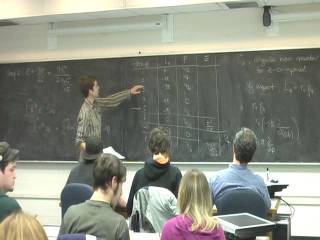Energy and Angular Momentum for a Particle on a Ring
Highlights of the activity
- This small group activity is designed to help students identify eigenstates and associated eigenvalues of a particle confined to a ring.
- Students work in small groups and identify energy and angular momentum eigenvalues for a variety of eigenstates as well as calculate the probability for angular momentum and energy in several different representations.
- The entire class wrap-up conversation summarizes how to identify certain quantum states and how they are related to a specific quantum measurement.
Reasons to spend class time on the activity
One central skill in learning quantum mechanics is identifying eigenstates and their associated eigenvalues, as well as identifying the probability with which those eigenvalues will be measured. In this activity, students are given a state that is made up of linear combinations of energy/angular momentum eigenstates (for the particle confined to the ring, the angular momentum and energy are commuting observables). Students learn to identify the eigenstates in multiple representations and discuss how eigenvalues are related to the results of a quantum measurement. Students are also asked to determine the probabilities of several measurements, highlighting the degeneracy of energy eigenvalues.
Reflections
Instructor's Guide
Student Handouts
Authors: Corinne Manogue, Kerry Browne, Elizabeth Gire, Mary Bridget Kustusch, David McIntyre
To edit this page, go here
